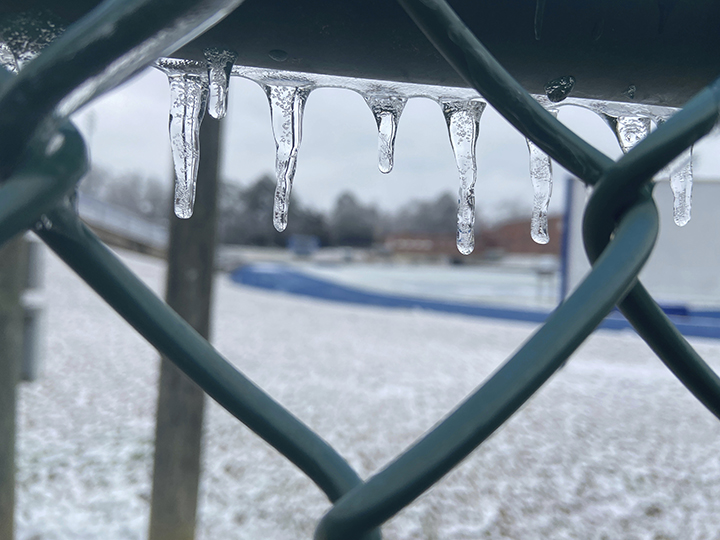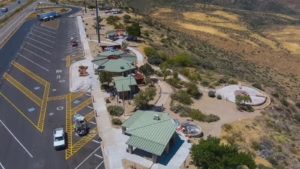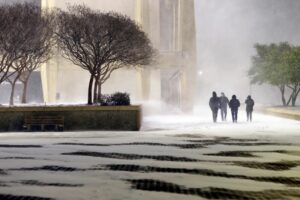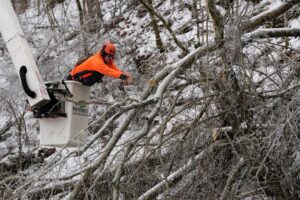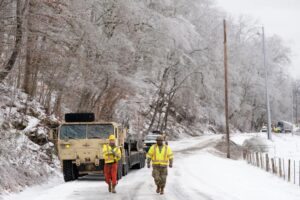Parts of the nation’s Deep South, where wintry precipitation already had left thousands without power, stranded drivers and interrupted efforts to vaccinate residents against the coronavirus, got still more snow and ice Wednesday, Feb. 17.
An Associated Press report from Kensington, Maryland, notes that meteorologists blame the historic chilly weather on a large disruption of the polar vortex with Arctic weather that’s normally kept penned near the North Pole, but it escaped and sent cold temperatures south.
Experts say this polar vortex is stronger and longer than usual, and these events are happening twice as often as they used to. They say it could be a mix of natural weather variations and human-caused climate change, but they’re not sure. The events show how vulnerable America is to extreme weather — both hot and cold — which increases with climate change, scientists said.
Delays in vaccine shipments and deliveries are likely because of severe weather across parts of the country. The Biden administration says the weather is expected to affect shipments from a FedEx facility in Memphis, Tennessee, and a UPS facility in Louisville, Kentucky. Both facilities serve as vaccine shipping hubs for multiple states. The Centers for Disease Control and Prevention and other federal agencies are working with the jurisdictions, as well as manufacturing and shipping partners, to assess weather conditions and to help offset potential delivery delays and cancellations.
Travel conditions quickly deteriorated in northern Louisiana Wednesday as freezing precipitation moving out of frozen Texas coated roads already layered with ice, transportation officials said. More and more homes and businesses lost electricity as storms spread eastward into the Mississippi Delta, where it was sleeting.
A winter storm warning and advisories that reached all the way from the Mexican border to the Washington, D.C., area included most of Louisiana and Mississippi; northwestern Alabama; and slivers of northern Georgia and South Carolina.
Extreme cold weather caused water-pressure problems in Mississippi’s capital city of Jackson, where the city told customers to boil water as a precaution, and roads remained icy in much of the state.
In icebound northwest Alabama, the only grocery store in tiny Hackleburg opened Wednesday since the power was back on and roads were clear enough for travel, manager Dennis Whitfield said in a telephone interview over the buzz of busy checkout lanes. Milk, produce and bread were in short supply since trucks can’t get to town from Birmingham, nearly 100 miles away, he said.
In Louisiana, more than 64,000 utility customers were in the dark, including more than 24,000 in East Baton Rouge Parish, and almost 15,000 were out in Mississippi. In some places, afternoon temperatures were not predicted to go much above freezing for an extended period until Friday.
For some, the weather prompted acts of charity.
In Clinton, Mississippi, Army veteran Evelyn Fletcher spent the past few days cooking all the food she had in her house to make plates to deliver to sidelined truck drivers, travelers and people staying at hotels because they lost power at home.
“They’re stranded, they’re isolated — people are in need of support right now,” Fletcher said.
On Monday, Fletcher made 85 meals. On Tuesday, a local restaurant, T’Beaux’s Crawfish and Catering, cooked 75 plates of shrimp and gumbo for her and other volunteers to deliver and she made 30 plates of her own. On Wednesday morning, Fletcher was cooking a pot of turkey noodle soup so she could go out again and deliver another 70 meals as the weather allowed.
“People are worried about more snow,” she said. “We are going to keep people fed and keep them feeling hopeful.”
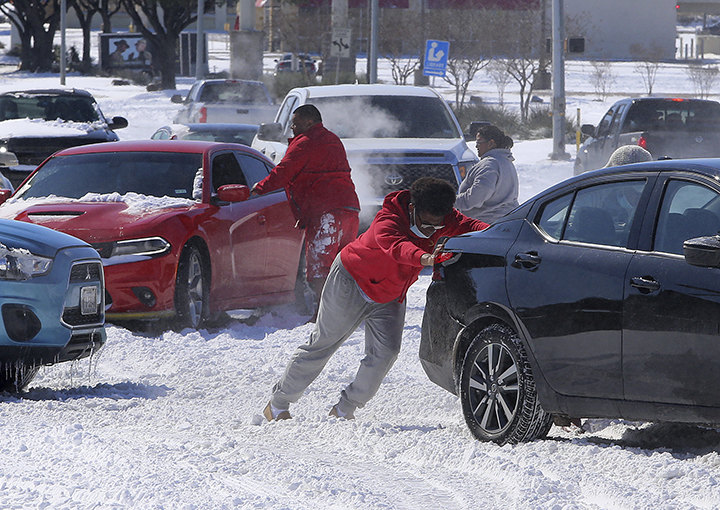
In addition to hazardous driving conditions, Texas is experiencing widespread power outages due in part to increased demand because of the cold temperatures. Joshua Rhodes, an energy researcher at the University of Texas in Austin, said the Texas electric grid fell victim to a cold spell that was longer, deeper and more widespread than the state had seen in decades.
“The system as we built it is not performing to the standards we would like to see,” he said. “We need to do a better job.”
Climate change should be factored in, too, Rhodes said. The long cold spell fits what scientists say is a pattern of worsening extremes of all kinds of weather under climate change.
“We’re going to have to plan for more of this kind of weather. People said this would never happen in Texas, and yet it has,” Rhodes said.
“One thing the Texas situation highlights is that we are likely to deal with more compound extreme weather events — multiple event weather systems that have cascading impacts on society and our infrastructure,” according to University of Georgia meteorology professor Marshall Shepherd.
In the nation’s capital, federal regulators say they are launching an “inquiry” into the operations of the bulk-power system during the severe winter storm that left millions without power in subfreezing temperatures in Texas and other states. The Federal Energy Regulatory Commission (FERC) and the North American Electric Reliability Corp. (NERC) announced the inquiry Tuesday.
In addition to snow, freezing rain and sleet, the storms have spawned tornados in some states. The National Weather Service confirmed Tuesday that a tornado struck an area of southwest Georgia where one home was destroyed, and several others were damaged. The weather service’s office in Tallahassee, Florida, reported that preliminary results of a damage survey show a tornado of at least EF-2 intensity struck Monday in the rural Georgia community of Damascus in Early County. No one was killed.
In Oklahoma, a “perfect storm” of record-breaking cold temperatures that led to unprecedented demand for energy, combined with inadequate supplies of natural gas to power gas-fired electric generation plants, led to rolling blackouts across much of the central U.S., according to officials at Southwest Power Pool, a wholesale energy transmission organization that serves part of 14 states.
In Tennessee, the Shelby County Health Department, which covers Memphis and its suburbs, said Tuesday that COVID-19 vaccinations at its five county-run sites are canceled through Saturday due to the hazardous driving conditions caused by winter storms.
Meanwhile, Illinois Gov. J.B. Pritzker on Tuesday issued a disaster proclamation after a winter storm blanketed the state with snow and caused power outages.
Parts of the Chicago area got up to a foot and a half of snow, shuttering schools to in-person classes Tuesday as officials urged residents to stay off the snow-filled roads. Roughly 7,000 Illinois households were without power. Illinois State Police and transportation officials are urging residents to stay at home while crews clear roadways.
West Virginia Gov. Jim Justice has declared a state of emergency in four western counties where an ice storm caused tens of thousands of power outages and knocked trees onto roads. The declaration Tuesday for Cabell, Lincoln, Putnam and Wayne counties allows the National Guard to assist in storm-related response. More than 60% of Appalachian Power customers in the four counties lost service.
More than 89,000 Appalachian Power customers remained without service in southern West Virginia on Tuesday afternoon. That represents 19% of the utility’s total customers in the state. The utility said some of the outages involved customers who were still without service from a Feb. 11 ice storm. The utility said it has nearly 2,600 crews and contractors from as far away as Illinois working to get service restored.
Normally sunny New Mexico is experiencing freezing temperatures, snow and icy road conditions. Snowfall led to more than 150 delays and closures Tuesday morning with residents being urged to stay home. Albuquerque city officials say 30 sanding and plowing vehicles are working 12-hour shifts to clear snow-packed roadways. The city’s buses are also operating on a limited capacity.
An Associated Press report from Valparaiso, Indiana, on Tuesday stated that a winter storm has dumped up to a foot and a half of snow on parts of northwestern Indiana, while a large swath of the state received between 6 inches and 8 inches of snow, creating hazardous road conditions.
Valparaiso residents awoke Tuesday to 18 inches of new snowfall, while Lake Station and Porter, also in northwestern Indiana, reported nearly 14 inches of snow, the National Weather Service said. Much of central, eastern and northeastern Indiana, and parts of southwestern Indiana, received between 6 inches and 8 inches of snow, with some areas reporting higher amounts. Lesser accumulations were reported across most of southern and southeastern Indiana.
Indianapolis police and public safety officials issued a travel advisory for the metropolitan area, urging residents to travel only if absolutely necessary through Wednesday morning to allow snowplows to clear snow from major thoroughfares. Schools were closed to in-person classes in communities that received the heaviest snowfall, where some businesses also had closed for the day.
Compiled by The Trucker News Staff from Associated Press reports
The Associated Press is an independent global news organization dedicated to factual reporting. Founded in 1846, AP today remains the most trusted source of fast, accurate, unbiased news in all formats and the essential provider of the technology and services vital to the news business. The Trucker Media Group is subscriber of The Associated Press has been granted the license to use this content on TheTrucker.com and The Trucker newspaper in accordance with its Content License Agreement with The Associated Press.




